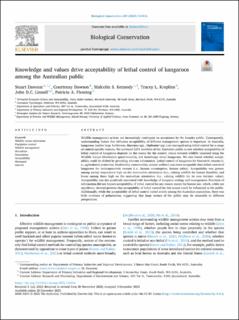| dc.contributor.author | Dawson, Stuart | |
| dc.contributor.author | Dawson, Courtenay | |
| dc.contributor.author | Kennedy, Malcolm S. | |
| dc.contributor.author | Kreplins, Tracey L. | |
| dc.contributor.author | Linnell, John Durrus | |
| dc.contributor.author | Fleming, Patricia A. | |
| dc.coverage.spatial | Australia | en_US |
| dc.date.accessioned | 2024-01-05T08:36:01Z | |
| dc.date.available | 2024-01-05T08:36:01Z | |
| dc.date.created | 2024-01-03T15:31:26Z | |
| dc.date.issued | 2023 | |
| dc.identifier.issn | 0006-3207 | |
| dc.identifier.uri | https://hdl.handle.net/11250/3110020 | |
| dc.description.abstract | Wildlife management actions are increasingly contingent on acceptance by the broader public. Consequently, understanding factors that influence acceptability of different management options is important. In Australia, kangaroos (native large herbivores, Macropus spp., Osphranter spp.) are managed using lethal control for a range of context-specific reasons. We surveyed 1293 members of the Australian public to test whether acceptability of lethal control of kangaroos depends on the reason for the control, values towards wildlife (assessed using the Wildlife Values Orientation questionnaire), and knowledge about kangaroos. We also tested whether acceptability could be shifted by providing relevant information. Lethal control of kangaroos for biocentric reasons (i. e., agricultural protection, biodiversity conservation, animal welfare) was more acceptable than lethal control of kangaroos for anthropocentric reasons (i.e., human consumption, human safety). Acceptability was greater among survey respondents high on the domination orientation (i.e., valuing wildlife for human benefits), and lower among those high on the mutualism orientation (i.e., valuing wildlife for its own intrinsic value). Acceptability was also positively associated with knowledge of kangaroo ecology and management. Provision of information did not impact acceptability of lethal control for any reason except for human use, which, while not significant, showed promise that acceptability of lethal control for this reason could be influential to the public. Additionally, while the acceptability of lethal control varied widely among the Australian population, there was little evidence of polarisation, suggesting that large sectors of the public may be amenable to different perspectives. | en_US |
| dc.language.iso | eng | en_US |
| dc.rights | Navngivelse 4.0 Internasjonal | * |
| dc.rights.uri | http://creativecommons.org/licenses/by/4.0/deed.no | * |
| dc.subject | wildlife values orientation | en_US |
| dc.subject | population control | en_US |
| dc.subject | wildlife management | en_US |
| dc.subject | mutualism | en_US |
| dc.subject | domination | en_US |
| dc.subject | acceptability | en_US |
| dc.subject | macropod | en_US |
| dc.subject | harvest | en_US |
| dc.title | Knowledge and values drive acceptability of lethal control of kangaroos among the Australian public | en_US |
| dc.type | Peer reviewed | en_US |
| dc.type | Journal article | en_US |
| dc.description.version | publishedVersion | en_US |
| dc.rights.holder | 0006-3207/© 2023 The Author(s). Published by Elsevier Ltd. This is an open access article under the CC BY license (http://creativecommons.org/licenses/by/4.0/). | en_US |
| dc.subject.nsi | VDP::Zoologiske og botaniske fag: 480 | en_US |
| dc.subject.nsi | VDP::Zoology and botany: 480 | en_US |
| dc.source.journal | Biological Conservation | en_US |
| dc.identifier.doi | 10.1016/j.biocon.2023.110416 | |
| dc.identifier.cristin | 2220125 | |
| dc.relation.project | Andre: Centre for Invasive Species Solutions (Grant No. P01-L-006) | en_US |
| cristin.ispublished | true | |
| cristin.fulltext | original | |
| cristin.qualitycode | 2 | |

